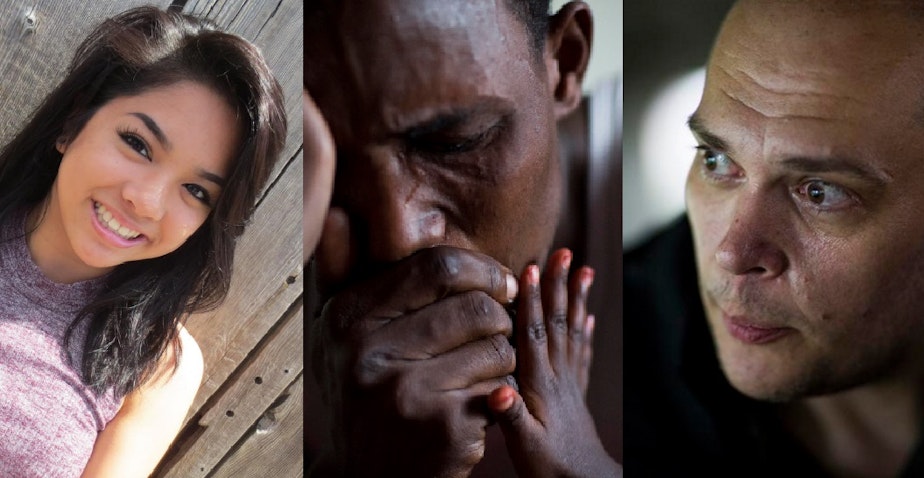KUOW reporters and editors win 5 regional Murrow awards

Innovative ideas. Relentless reporting. Heart-tugging moments.
These are central elements in the KUOW stories that won critical acclaim this week, including five awards in the Regional Edward R. Murrow Awards from the Radio Television Digital News Association.
The awards include two regional Murrows for KUOW's RadioActive Youth Media, a program to help young people discover public radio journalism.
KUOW reporters and editors also won regional Murrows for:A documentary covering months of reporting on Seattle’s homeless crisisA series about new refugees adapting to their new lifeA story about how one family turned a tragedy into political activism focused on gun violence.
And KUOW’s collaboration with Marlo Mack for the podcast “How to be a Girl” – about one Seattle mom and her transgender daughter – added to the recognition it has already received with a Webby award.
And the winners are:
EXCELLENCE IN INNOVATION
RadioActive Youth Media
KUOW’s RadioActive Youth Media is what the news sounds like when it is reported by teenagers.
In 2016, RadioActive youth producers covered homelessness, mental health, immigration, racial identity, and more, from their position as high school students. Through these stories, we gain a deeper understanding of how news events affect young people whose voices are rarely heard by the greater public.
RadioActive won for a selection of five stories pitched, reported, written and produced by youth ages 16-18 in an Intro to Journalism workshop. Their stories were held to KUOW’s editorial standards and broadcast on KUOW’s drive-time programs, reaching tens of thousands of listeners. The stories reached many tens of thousands more on KUOW.org and through podcasts.
The stories:
“I was homeless and my life was trash. Then this Seattle family took me in." Reporter: April Reyes. Mentor: Nina Tran. Editor: Jenny Asarnow
“I Always Wondered What a Psychiatric Hospital Was Like, And There I Was.” Reporter: Fallon [last name withheld for medical privacy]. Mentor: Lila Kitaeff. Editor: Carol Smith
“The scariest thing about heroin? 'You're gonna love it.'” Reporter: Brian Freeland. Mentor: Angela Nguyen. Editor: Jim Gates.
“Depression in 7th grade: 'I want to die but if I could get help that would be awesome.'” Reporter: Natalie Newcomb. Mentor: Ann Kane. Editor: Jenny Asarnow.
“My dad's Cinderella story: Finding love in Somalia." Reporter: Zubeyda Ahmed. Mentor: Angela Nguyen. Editor: Jenny Asarnow.
FEATURE REPORTING
"I was homeless and my life was trash. Then this Seattle family took me in.," by April Reyes. Mentor: Nina Tran. Editor: Jenny Asarnow
For most people, family will always be family because you’re blood. For others, it doesn’t quite work that way. High school junior April Reyes was homeless and couch surfing. Then, a bunch of strangers became her family. April's powerful and personal feature story was produced in RadioActive’s summer workshop last year – the first radio story she ever created.
HARD NEWS
"They Lost Their Son and Daughter to Murder-Suicide. Now They’re Pushing for Gun Control," by Amy Radil, edited by Jim Gates
A Washington couple, Marilyn Balcerak and Matt Smith, lost their adult children to gun violence when Balcerak’s autistic son killed his stepsister and then himself. The couple became the citizen sponsors of a ballot measure allowing judges to take guns away from people in crisis. Opponents feared the measure could stigmatize the mentally ill and deprive those people of their rights.
KUOW’s Amy Radil spoke Balcerak and Smith about their ordeal and their push for Initiative 1491. “I always say I’m not a survivor, I’m surviving gun tragedy every day,” Smith told Radil.
I-1491 passed overwhelmingly on Nov. 8, 2017.
NEWS DOCUMENTARY
"Out of the Jungle," by Joshua McNichols and Kate Walters, edited by Carol Smith with sound design by Whitney Henry-Lester.
In January 2016, a shooting left two people dead in Seattle’s notorious Jungle homeless encampment. The mayor immediately proclaimed he would shut it down and kick out more than 400 people living in tents under a there-mile stretch of freeway. But that wasn’t so easy to accomplish.
KUOW’s documentary “Out of the Jungle” captured nine months of intensive reporting on the Jungle – what created it, what policies caused it to persist, and what kinds of solutions to Seattle’s homelessness crisis it suggested.
At the time we began reporting, the Jungle was considered so dangerous that fire crews, who were frequently called in for emergencies, would not enter without police escort. Reporters Joshua McNichols and Kate Walters worked to build relationships with Jungle residents and access to the encampment. They worked under difficult conditions to bring the humanity of the Jungle residents forward while also holding policy-makers accountable for their role in creating and perpetuating the Jungle.
NEWS SERIES
"Upon Arrival," by Liz Jones, edited by Carol Smith
For many refugees, the first year can feel like a race against the clock to set up a new life.
Immigration reporter Liz Jones followed three new refugee arrivals, from touchdown at Sea-Tac Airport to eight months into their lives in Seattle for her series, “Upon Arrival.” Eight months, because that’s when refugees without families stop receiving small federal payments. Their stories are as different as the countries they come from, but they start with a similar thread – leaving despair behind and grasping for hope.
PODCASTS & DIGITAL AUDIO — BEST WRITING
“How to be a Girl,” Marlo Mack, edited by Jim Gates and Whitney Henry-Lester
How do you raise a transgender child? This podcast addresses that challenge. It stars a single mom and her "kiddo" as they work together to sort out just what it means to be a girl. How to be a Girl also was recognized as one of the 50 best podcasts of 2016 by both The Atlantic and The Guardian.
